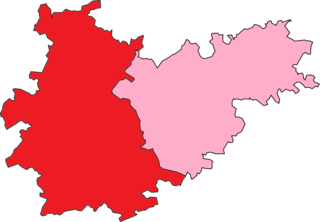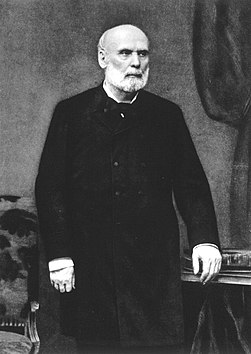
Jacques Marie Eugène Godefroy Cavaignac, known as Godefroy Cavaignac, French politician, was born in Paris. He was the son of Louis Eugène Cavaignac. He made public profession of his republican principles as a schoolboy at the Lycée Charlemagne by refusing in 1867 to receive a prize at the Sorbonne from the hand of the prince imperial.
The Radical Republicans were a faction of American politicians within the Republican Party of the United States from around 1854 until the end of Reconstruction in 1877. They called themselves "Radicals" with a sense of a complete permanent eradication of slavery and secessionism, without compromise. They were opposed during the War by the moderate Republicans, by the conservative Republicans, and by the pro-slavery and anti-Reconstruction Democratic Party as well as by conservatives in the South and liberals in the North during Reconstruction. Radicals led efforts after the war to establish civil rights for former slaves and fully implement emancipation. After weaker measures in 1866 resulted in violence against former slaves in the rebel states, Radicals pushed the Fourteenth Amendment and statutory protections through Congress. They disfavored allowing ex-Confederates officers to retake political power in the South, and emphasized equality, civil rights and voting rights for the "freedpeople", i.e. people who had been enslaved by state slavery laws within the United States.

The Radical-Socialist and Radical Republican Party was a liberal and social-liberal political party in France. It was also often referred to simply as the Radical Party, or to prevent confusion with other French Radical parties as the Parti radical valoisien, abbreviated to Rad, PR, or PRV.

The 1892 United Kingdom general election was held from 4 July to 26 July 1892. It saw the Conservatives, led by Lord Salisbury, win the greatest number of seats, but not enough for an overall majority as William Ewart Gladstone's Liberals won many more seats than in the 1886 general election. The Liberal Unionists who had previously supported the Conservative government saw their vote and seat numbers go down.

The Republicans is a national conservative political party in Germany. The primary plank of the programme is opposition to immigration. The party tends to attract protest voters who think that the Christian Democratic Union (CDU) and the Christian Social Union of Bavaria (CSU) are not sufficiently conservative. It was founded in 1983 by former CSU members Franz Handlos and Ekkehard Voigt, and Franz Schönhuber was the party's leader from 1985 to 1994. The party had later been led by Rolf Schlierer, until 2014. The Republicans had seats in the European Parliament between 1989 and 1994, Abgeordnetenhaus of West Berlin in 1989–1990 and in the parliament of the German state of Baden-Württemberg between 1991 and 2001.
The Cartel of the Left was the name of the governmental alliance between the Radical-Socialist Party the socialist French Section of the Workers' International (SFIO), and other smaller left-republican parties on two occasions between the World Wars. The Cartel des gauches twice won general elections, in 1924 and in 1932. The first Cartel was led by Radical-Socialist Édouard Herriot, but the second was weakened by parliamentary instability and was without one clear leader. Following the 6 February 1934 crisis, President of the Council Édouard Daladier had to resign, and a new Union Nationale coalition, led by the right-wing Radical Gaston Doumergue, took power.

Édouard Lockroy was a French politician.

French legislative elections took place on 5 June and 12 June 1988, to elect the ninth National Assembly of the Fifth Republic, one month after the re-election of François Mitterrand as President of France.

Argentina held national presidential and legislative elections on Sunday, October 28, 2007, and elections for provincial governors took place on staggered dates throughout the year. For the national elections, each of the 23 provinces and the Autonomous City of Buenos Aires are considered electoral districts. Voter turnout was 76.2%.

The 2006 congressional elections in Arizona were elections for Arizona's delegation to the United States House of Representatives, which occurred along with congressional elections nationwide on November 7, 2006. Arizona has eight seats, as apportioned during the 2000 United States Census. Prior to the election, Republicans held six of the eight seats and Democrats held two. In the 8th district, Republican Congressman Jim Kolbe retired, leaving an open seat. Following the elections, Democrats gained two seats at the expense of the Republicans, who lost two.
The Gauche Plurielle was a left-wing coalition in France, composed of the Socialist Party, the French Communist Party, the Greens, the Left Radical Party, and the Citizens' Movement. Succeeding Alain Juppé's conservative government, the Plural Left governed France from 1997 to 2002. It was another case of cohabitation between rival parties at the head of the state and of the government. Following the failure of the left at the 2002 legislative election, it was replaced by another conservative government, this time headed by Jean-Pierre Raffarin.

The 1898 general election was held on 8 and 22 May 1898.

The 1919 legislative election, the first election held after World War I, was held on 16 and 30 November 1919.

Elections to Spain’s legislature, the Cortes Generales, were held on 19 November 1933 for all 473 seats in the unicameral Cortes of the Second Spanish Republic. Since the previous elections of 1931, a new constitution had been ratified, and the franchise extended to more than six million women. The governing Republican-Socialist coalition had fallen apart, with the Radical Republican Party beginning to support a newly united political right.
The Progressive Republicans were a parliamentary group in France active during the late 19th century during the French Third Republic.

The 9th constituency of the Pas-de-Calais is a French legislative constituency in the Pas-de-Calais département.

The Socialist Party is a social-democratic political party in France and was, for decades, the largest party of the French centre-left. The PS used to be one of the two major political parties in the French Fifth Republic, along with the Republicans. The Socialist Party replaced the earlier French Section of the Workers' International (SFIO) in 1969, and is currently led by First Secretary Olivier Faure. The PS is a member of the Party of European Socialists (PES), the Socialist International (SI) and the Progressive Alliance.

The 2nd constituency of the Tarn-et-Garonne is a French legislative constituency in Tarn-et-Garonne département. Like the other 576 French constituencies, it elects one MP using the two-round system, with a run-off if no candidate receives over 50% of the vote in the first round.





















